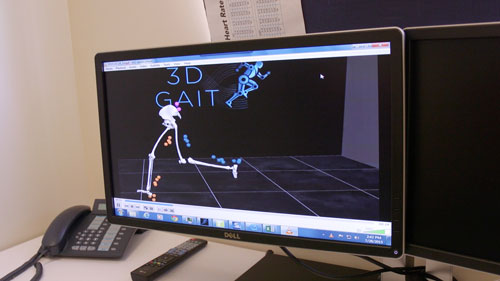 Biomechanical Assessment of Athletes: The emerging discipline of Kinesiology focuses on optimizing human movement, performance, health, and wellness. Students, professors, and coaches from Kinesiology, Engineering, and Athletics are drawing upon this new discipline to conduct biomechanical analyses of athletes in order to improve performance and minimize the risk of injury.
Biomechanical Assessment of Athletes: The emerging discipline of Kinesiology focuses on optimizing human movement, performance, health, and wellness. Students, professors, and coaches from Kinesiology, Engineering, and Athletics are drawing upon this new discipline to conduct biomechanical analyses of athletes in order to improve performance and minimize the risk of injury. Coral Reef Restoration: A Jacksonville University team of Marine Science, Mathematics, and Geography students and professors are studying the impact coral-eating fish and algae have upon coral reef health in the Florida Keys, and they are determining if the positioning of coral transplants in the ocean floor affects their ability to survive. Through the team’s combined efforts, JU anticipates improving coral reef restoration efforts thereby benefitting Florida’s ecology and economy.
Coral Reef Restoration: A Jacksonville University team of Marine Science, Mathematics, and Geography students and professors are studying the impact coral-eating fish and algae have upon coral reef health in the Florida Keys, and they are determining if the positioning of coral transplants in the ocean floor affects their ability to survive. Through the team’s combined efforts, JU anticipates improving coral reef restoration efforts thereby benefitting Florida’s ecology and economy.
 Mobile Water Quality Monitoring: A cost-effective method of creating a database of water quality indicators in Northeast Florida is desired. Marine Science Research Institute (MSRI), Engineering, and Geography and the Environment will collaborate to build and deploy the waterproof monitors. Using this database, MSRI will make recommendations to governmental and private entities about ways to improve the water quality in the St. Johns River and other regional aquatic ecosystems.
Mobile Water Quality Monitoring: A cost-effective method of creating a database of water quality indicators in Northeast Florida is desired. Marine Science Research Institute (MSRI), Engineering, and Geography and the Environment will collaborate to build and deploy the waterproof monitors. Using this database, MSRI will make recommendations to governmental and private entities about ways to improve the water quality in the St. Johns River and other regional aquatic ecosystems. Oyster Reef Assessment: Harvesting of oysters in Northeast Florida was halted when the monitoring stations used to assess the health of the beds were discontinued over 15 years ago. There is growing interest in reopening the beds to commercial and recreational harvesting. Students and professors from the Marine Science Research Institute (MSRI), the School of Aviation, and Geography and the Environment are collaborating to develop a cost-effective method of monitoring the health of oysters reefs in Duval County.
Oyster Reef Assessment: Harvesting of oysters in Northeast Florida was halted when the monitoring stations used to assess the health of the beds were discontinued over 15 years ago. There is growing interest in reopening the beds to commercial and recreational harvesting. Students and professors from the Marine Science Research Institute (MSRI), the School of Aviation, and Geography and the Environment are collaborating to develop a cost-effective method of monitoring the health of oysters reefs in Duval County.
The State of Florida was so convinced of the need for such graduates that JU was able to secure a $12 million public investment last year – the largest state funding in the University’s 81-year history – to help launch EPIC. Additional grants and contract awards in the millions of dollars and future commitments mean the University is well-positioned to meet its goals.
“The Florida EPIC Program at Jacksonville University focuses heavily on developing academic programs to meet Florida’s workforce needs,” said Davlantes. “This education initiative is focused on specialized fields that create job opportunities, improve the quality of the workforce in our region and make our areas attractive to talented students from around the world to study, live and work in Florida.”
Using the operating and capital funding provided by Florida’s Legislature in 2014, Jacksonville University has already made substantial progress. The overwhelming majority of the funds is directly supporting faculty teaching in relevant academic programs.Highlights include:
- Adding 21 programs and degrees in areas identified by employers as being in highest demand, such as in health sciences, with 5 masters of science in nursing degrees, 3 doctorate of nurse practitioner programs and a bachelor of science degree; in business, with two bachelor’s degrees, 2 new concentrations in the Davis College of Business’ MBA degree program and a new concentration in marketing at the undergrad level; and in science and engineering, with 2 new bachelor’s degrees in engineering and 1 in computing science.
- Cutting-edge new laboratories built, and existing ones refreshed, in health sciences and science and engineering, at a cost of more than $2 million.
- Creation and enhancement of inter-disciplinary learning spaces throughout campus, investing more than $1 million, as well as building a high-tech broadcast media studio.
- Establishment of new business partnerships with other universities, local and state business interests, government and non-profit organizations, venture capitalists, and the military.
- Substantial upgrades of campus infrastructure for accelerated programming, with investment in new key personnel, capital projects, updated software and economic impact studies, at a cost of more than $6.5 million.
Already, the combined number of undergraduate and graduate degrees granted in STEM and healthcare science majors since EPIC began in 2014 is more than 1,000, and JU anticipates producing an equal number of baccalaureate and graduate degree graduates in these disciplines for 2015-16.
“This new program is helping establish JU as a recognized leader in trans-disciplinary education,” said JU President Tim Cost. “All of our efforts are focused on one thing: investing in a 21st-century workforce.”
Portions of this article appeared in the December 2015 issue of Advantage Business Magazine.
 Wave Magazine Online Jacksonville University News Hub
Wave Magazine Online Jacksonville University News Hub
